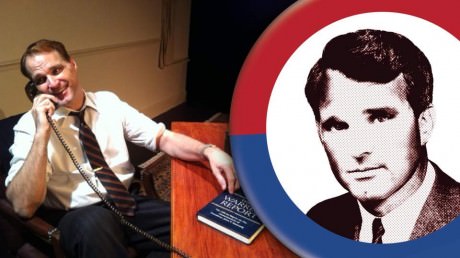RFK is a triumph.
A Capital Fringe production from Philadelphia’s New City Stage, it’s a powerfully moving flashback for anyone who remembers Robert F. Kennedy’s life and times, and an illuminating tribute for anyone born more recently. But moreover: It’s a profoundly revelatory lens for us all on U.S. life and times today.

The time frame of RFK is summer 1964 (when LBJ passed over Bobby for veep) till June 1968 (when RFK was shot). The stage feels packed full—of people, events, places. Yet the whole extraordinary enterprise is brought to life by one actor only (with impressive panache by Russ Widdall) aided by intermittent projections and audio.
But I have to be honest: It was the playscript by Jack Holmes (who first played the title role on stage as well) that had me rapturous by the end. It is as exquisitely crafted as any one-person show I have ever witnessed (and I scavenge for them; I seek out and see as many as I can). By the time RFK closes—with the song lyrics “Anybody here seen my old friend Bobby? Can you tell me where he’s gone?”—I found myself quietly weeping. Not just at the loss of a politician whom I remember as being a personal hero on civil rights and who had became, before the public’s eyes, a better person than he’d been in private life (how often does that ever happen?). No. I think I was also mourning the loss of an America.
It started to hit me early on. There are some wicked bits about J. Edgar Hoover, whom he bugged, his fiendish fascination with the lives of others, how he resented reporting to Bobby as attorney general not his brother the president. And I’m thinking to myself:
Those were the good old days. That was before an unchecked NSA pried into everyone’s business around the world, answerable only to a secret court that passed out rubber-stamp permission slips to commit unconstitutional espionage…
There are also some behind-the-scenes exchanges about the Vietnam War, the dubious grounds for going into it, Johnson’s failed promise of victory, the senseless human carnage, the sullying of a nation’s name. And I’m thinking to myself:
Those were the good old days. That was before Shrub (aka Bush Jr.) got the country enmired in Iraq, on a specious pretext, the senseless human carnage, the pissing away of a nation’s reputation…
RFK poignantly looks back. It also, implicitly, reflects on now.
Anybody here seen my old friend America? Can you tell me where it’s gone?
Don’t miss this one.
RFK plays through July 25, 2013 at The Studio Theatre Stage 4 -1501 14th Street, NW, in Washington, DC. For performance information and to purchase tickets, go to their Capital Fringe page.
LINK
2013 Capital Fringe Show Preview: ‘RFK’ by Russ Widdall.




